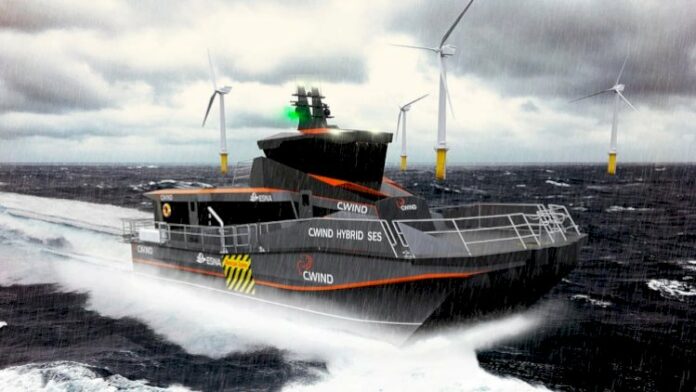Corvus Energy has signed a contract with SEC Marine Ltd, UK to supply the energy storage system (ESS) for the world’s first hybrid surface effect ship (SES) for crew transfer.
The development of the 22m hybrid SES for use as a crew transfer vessel is in response to an industry-wide push to develop and deploy innovative technologies that reduce CO2 emissions, while cost-effectively servicing windfarms located offshore. The vessel design has been developed in partnership with the operator CWind and ESNA, a ship design company based in Kristiansand, Norway, which specializes in commercially competitive vessels with surface effect technology to deliver significant carbon reductions.
Trygve Halvorsen Espeland, naval architect at ESNA, points to the advantages:
“We see that hybrid propulsion in vessels like offshore wind crew transfer vessels enables a greener footprint and multiple benefits for the vessel owners. The vessels have the benefit of range with the combustion engine, while the batteries provide both increased speed with power boost, peak shaving and reduced fuel consumption. Moreover, the engines will have fewer running hours and the silent hours on board will be appreciated by the crew and passengers. The vessel design will accommodate further developments in hybrid propulsion and battery technology, ensuring it has the capability of being developed into a totally carbon-free solution in the future.”
The crew transfer vessel is designed with two catamaran hulls, closed area between and an inflated rubber bag in the stern which supports up to 80% of the vessel weight when filled with air. The remaining 20% is supported by hull buoyancy. Less hull resistance enables higher vessel speed and less wave contact gives reduced motion for the crew.
Kim Klokkervold, Senior Sales Manager at Corvus Energy is clear in his predictions:
“The electrification of crew transfer boats and smaller workboats has only just begun. We are confident that we will see a massive shift from diesel to battery-hybrid powered propulsion on all kinds of smaller workboats due to substantial benefits and increased focus on reducing emissions.”
The lightweight Corvus Energy Dolphin modules are ideally suited to crew transfer vessels as they are tailormade for weight-sensitive vessels and have multiple possibilities of installation which ensures the optimal hybrid solution for maximum emission savings. Moreover, batteries are safer and quieter for the crew, and save both fuel and maintenance costs for the owners.
The vessel will be built at Wight Shipyard Co in the UK and is expected to service the Borssele 1 and 2 offshore windfarms located 23 kilometers off the Dutch coast from mid-2020.



